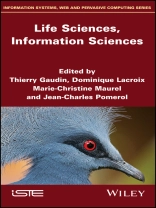Developed from presentations given at the Cerisy SVSI (Sciences de la vie, sciences de l’information) conference held in 2016, this book presents a broad overview of thought and research at the intersection of life sciences and information sciences.
The contributors to this edited volume explore life and information on an equal footing, with each considered as crucial to the other. In the first part of the book, the relation of life and information in the functioning of genes, at both the phylogenetic and ontogenetic levels, is articulated and the common understanding of DNA as code is problematized from a range of perspectives. The second part of the book homes in on the algorithmic nature of information, questioning the fit between life and automaton and the accompanying division between individualization and invariance.
Consisting of both philosophical speculation and ethological research, the explorations in this book are a timely intervention into prevailing understandings of the relation between information and life.
Cuprins
Part 1. From Gene to Species: Variability, Randomness and Stability
1. The Emergence of Life: Some Notes on the Origin of Biological Information, Antonio Lazcano.
2. Fluctuating RNA, Giuseppe Zaccai, Marie-Christine Maurel and Ada Yonath.
3. Artificial Darwinian Evolution of Nucleic Acids, Frédéric Ducongé.
4. Information and Epigenetics, András Páldi.
5. Molecular Forces and Motion in the Transmission of Information in Biology, Giuseppe Zaccai.
6. Decline and Contingency, Bases of Biological Evolution, Bernard Dujon.
7. Conservation, Co-evolution and Dynamics: From Sequence to Function, Alessandra Carbone.
8. Localization of the Morphodynamic Information in Amniote Formation, Vincent Fleury.
9. From the Century of the Gene to that of the Organism: Introduction to New Theoretical Perspectives, Maël Montévil, Giuseppe Longo and Ana Soto.
10. The Game of Survival, Chance and Complexity, Philippe Kourilsky.
11. Life from the Origins to Homosapiens, Jean Fourtaux.
12. Plankton Chronicles and the Tara Expeditions, Christian Sardet.
13. The Living Species is Not a Natural Kind but an Intellectual Construction, Philippe Grandcolas.
14. The Boxes and their Content: What to Do with Invariants in Biology? Guillaume Lecointre.
15. Probability, Sense and Evolution (Promenade), Cédric Villani.
Part 2. Program and Life: Individuation and Interaction
16. Towards an Algorithmic Approach to Life Sciences, Gérard Berry.
17. Where Does the Notion of Function Come From? Heinz Wismann.
18. The Contribution of Artificial Life to Theoretical Biology, Hugues Bersini.
19. Biochemical Programs and Analog- Digital Mixed Algorithms in the Cell, François Fages and Guillaume Le Guludec.
20. From Computational Physics to the Origins of Life, A. Marco Saitta.
21. Computing and the Temptation of Babel, Kavé Salamatian.
22. Big Data, Knowledge and Biology, Giuseppe Longo and Maël Montévil.
23. Natural Language, Formal Language and the Description of the Living World, Régine Vignes Lebbe.
24. Vital Individuation and Morphogenetic Information, Vincent Bontems.
25. How to Account for Interspecies Socio-cultural Phenomena? An Evolutionist and Interactionist Model, Dominique Guillo.
26. Life: A Simplex Whirlwind between Matter, Energy and Information, Jean-Claude Barrey.
27. Nutritional Interactions through the Living: from Individuals to Societies and Beyond, Mathieu Lihoreau.
28. Epigenetic Regulation of Protein Biosynthesis?by Scale Resonance: Study of the Reduction of ESCA Effects on Vines in Field Applications -Summary 2016, Pedro Ferrandiz, Michel Duhamel and Joël Sternheimer.
29. Quantum and Multiverse Inflation, Michel Cassé.
30. Reontologization of the World and of Life, Jean-Gabriel Ganascia.
31. Redesigning Life, a Serious and Credible Research Agenda? Bernadette Bensaude Vincent.
32. Transhumanism and the Future of Negation, Jean-Michel Besnier.
Despre autor
Thierry Gaudin is an engineer at MINES Paris Tech and holds a doctorate in Information Sciences and Communication from Paris Nanterre University. He is a widely renowned expert in innovation policy and has worked with the OECD, European Commission and the World Bank.
Dominique Lacroix is a web publisher and photographer. After studying Classics at the University of Nice in France, she acquired diverse experience in multimedia. She is a co-founder, with Thierry Gaudin, of the 2100 Foundation.
Marie-Christine Maurel is Professor at Pierre and Marie Curie University (UPMC) and the Muséum National d’Histoire Naturelle in Paris. Her research focuses on the informational and catalytic properties of DNA and RNA and their role in the origin of life.
Jean-Charles Pomerol is a specialist in Decision Support Systems and former project leader for information technology in the Engineering Sciences Department at the CNRS. He was formerly in charge of the Artificial Intelligence laboratory at UPMC, Paris, as well as being the President of UPMC between 2006 and 2011.












